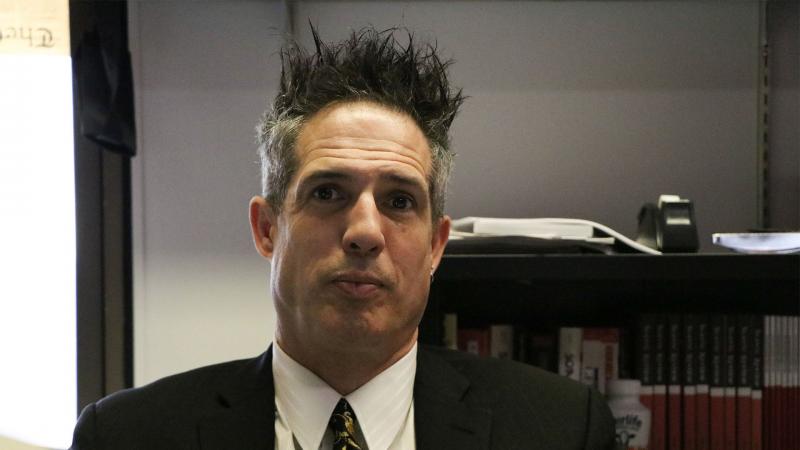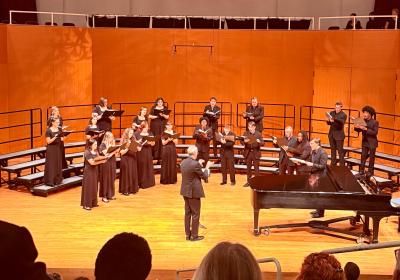
People of CSU - Professor Todd Nelson, an expert on Russia
Professor Todd Nelson is part of the Department of Political Science at Cleveland State University. His research is focused on the uses of history for political purposes with an emphasis on the memory politics of Russia, Ukraine and the history of human rights and genocide.
Call it dedication, but since the 1990s, Nelson in some shape or form has been studying the history of Russia. No Tzars come from Nebraska. However, his education at the University of Nebraska-Lincoln allowed Nelson to study abroad in 1993 in St. Petersburg, Russia, while he was obtaining his Bachelor's degree in Russian and sociology.
Culture shock, including in the academy, was something Nelson had to deal with. Take exams. Nelson explained that exams in Russia are done orally in front of a committee of professors. Some you knew, others you had never seen before.
“It’s totally different actually," Nelson said of the oral exam system. "You went into a room and took a little piece of paper out of a hat, and that had what you were supposed to talk about, and you have some time to look through some books to formulate your answer, this is all of course in Russian.”
"That is obviously not the way we do things,” Nelson said of his classmates, most of whom were from the U.S. or Britain.
During one exam, Nelson recalled watching a student go in ahead of him. Then he heard a lot of laughter from inside the room. He thought this meant the environment was lighthearted and fun.
“The door flies open and she’s sobbing. She runs down the hall sobbing, and they are like 'Next!'” Nelson said. “Basically, the professors just mock you. There is nothing positive whatsoever, it's all just critical and really brutal, and they are mocking you and your accent.”
At the time the education model was still a holdover from the era of the Soviet Union, which had collapsed in 1991, two years before Nelson arrived in Russia.
Nelson said the Soviet education model was based on creating solidarity among the students, turning them against their professors in a battle of minds.
The system was flawed in many ways, especially when Josef Stalin was in power and bent education to politics. But it did produce the world's only other superpower after World War II, sent men and women into space first and produced many of the world's top scientists and chess players.
Today, it's changed a lot. Nelson got to experience that firsthand in 2009 when he was a research scholar at the School of International Relations at St. Petersburg State University.
“It’s very western now, and it’s sort of like an industry," he said. "They have a lot of western students, and they teach classes in English."
Subject matter expert
After getting his bachelor's, Nelson moved to Washington, D.C., where he worked on the Global Organized Crime Project as the Russian Affairs expert at the Center for Strategic and International Studies (CSIS), a bipartisan think tank. At the time, he was pursuing his master's degree in International Affairs-Russia/Eurasia at the American University.
As a subject matter expert at CSIS, Nelson spent his mornings poring over any new information about Russia, including from U.S. German and Russian newspapers. He would then brief his boss, who was fielding questions from reporters.
Part of Nelson's work on the Global Organized Crime Project was to put together lists of mobbed-up Russians. He added that under President Vladimir Putin organized crime in Russia today is not as big a problem as it used to be.
“He sort of said, 'Look you can keep everything you got, but you have to go legit,'” Nelson explained. “We can't have it look like mobsters are running the country. 'From guns to briefcases' is the expression because everyone just suddenly became a businessman.”
Nelson said organized crime became an issue in Russia as the Soviet Union was collapsing and transitioning to the current system.
The collapse of the Soviet economy then the Soviet Union, followed by the chaotic transition to democracy and capitalism engineered largely by U.S. and European advisers to the post-Soviet leadership meant the state had fewer resources and was unable to take care of a lot of issues like rule of law, protection services, even basic services.
“Rule of law was iffy, and no one was enforcing contracts. It was a time of dramatic change in Russia,” Nelson said. “Organized crime stepped in to fill a lot of the roles that formerly were filled by the state.”
Nelson also spent time as the editor and an author on a critical policy paper for the Global Organized Crime Project called “Russian Organized Crime and Corruption: Putin's Challenge.” Nelson said he was unaware of how much influence politics had on the paper since policy papers went to members of congress.
“It was a lot more political than I was aware. To me, you go to where the evidence points you,” Nelson said. “I shouldn't say that it’s not acceptable but that ruffled some feathers of some people.”
Military Intelligence - finding his love of teaching
Nelson is multilingual. He speaks fluent English, Russian and German and has some Ukrainian, Polish and French. These were sought-after skills. In 2000, Nelson joined the US Army and became a Russian/German/Ukrainian Linguist and interrogator in the Military Intelligence Corps.
He joked that there isn't much work for interrogators during periods of peace. People would call interrogators "the motor pool rangers" because they spent all their time working on vehicles and not interrogating people.
However, after Yugoslavia collapsed, Nelson was deployed to Kosovo on a nine-month deployment from November 2002 to July 2003. He would not be a motor pool ranger any longer because he was now on his way to conduct interrogations and act as a liaison with the Ukrainian and Russian military.
“I had to do a lot of interrogations, actually, and so that was pretty cool," Nelson said.
Yugoslavia had been a patchwork quilt of languages. Nelson didn't speak Albanian or Croatian, but was able to do his job, as many of the people he worked with had German, Russian or English. For example, many of the Albanians had worked in Germany or Switzerland, so they spoke German.
Nelson would go into towns with convoys as part of tactical human intelligence teams. As it was only three years removed from the Kosovo war, tensions were still high. Different military coalitions controlled different sectors.
In particular, Nelson would go to meetings on the Macedonian border. These meetings would have people from Bulgaria, Ukraine, Russia, and others, with the Russians running the briefing. Nelson’s chief would put him to work, talking to and befriending the Russian soldiers there.
“My chief was like, 'Nelson, just talk to these guys. See if you can find anything out that we didn't hear in the briefing room,'” Nelson said. “So we got to be buddies. And they told me all of this stuff that they hadn't even mentioned to anybody in the briefing.”
Nelson said his time in Kosovo with the Army helped him discover his future career, as he found a school in Kosovo that was hiring people with master’s degrees to teach classes.
Nelson admitted that he was nervous about speaking in public at first, but he got more comfortable doing it over time. The classes he taught were introductory international relations courses and CIA and intelligence in the U.S. course.
“The more you do it, the more comfortable you get doing it. But I was like, I really love doing that,” Nelson said. “So that made up my mind that when I got back to the States, I was going to become a professor.”
Nelson pointed out that teaching there was an interesting experience and that the students were nice. He noted that he was left to his own to create his syllabi, work out his course plan, and everything else.
Nelson would eventually return from Kosovo, and his time in the military would end in 2004.
Cleveland State University - writing a book
Nelson enrolled at Kent State University and get his Ph.D. in Political Science-Transnational and Comparative Politics in 2013. His dissertation on memory politics in Russia was a finalist for the prestigious Stephen Cohen-Robert Tucker Dissertation Prize in 2014, awarded by the Association for Slavic, East European, and Eurasian Studies.
Before he graduated from Kent State, Nelson got his first start at Cleveland State as an adjunct professor in 2012. Then in 2016, Nelson would become a visiting professor before getting hired in 2019 on a tenure track.
Nelson's dissertation was published in 2019 as a book, title “Bringing Stalin Back In: Memory Politics and the Creation of a Useable Past in Putin's Russia.” It's about how Putin’s government is portraying Stalinism.
“Stalin is portrayed favorably as this leader who got the Soviet Union through World War II. The subtext in that narrative is that Stalin was able to do this because he had this very highly centralized regime,” Nelson said. “So by implication, Putin is saying my authoritarianism isn't that bad. World War II is really the vehicle that Putin uses to transmit that message because it's called the Great Patriotic War in Russia.”
Nelson explained the two narratives surrounding Stalin in Russia. One is that Stalin won World War II for the Soviet Union. Two is that Stalin was a murderous tyrant who sent everybody to the gulag (prison camp) and executed people.
Advocates of Putinism reconcile the two narratives by saying that for the Soviet Union to defeat the Germans, they needed to have the gulags because they needed to modernize the Soviet Union. After all, Stalin knew a war was coming.
“There's a war coming and (Stalin) needed to raise this convict army that was going to rapidly industrialize the Soviet Union,” Nelson said. “So it gets attached to the war narrative as we had to do this in order to win the war.”
To many Russians, the Great Patriotic War is important, and Russia has a year-round celebration that is a constant memorialization of the war. Nelson pointed out that democracy is not portrayed very favorably in Russian history.
“Throughout Putin's rule and the way that it goes is that students are taught that there are these rulers in Russia throughout Russian history who have done these tremendous things for the Russian state but at a tremendous human cost,” Nelson said.
Nelson listed examples that fit that description - Ivan the Terrible, Peter the Great and Stalin.
“Putin is portrayed as the next in that line,” Nelson said. “Putin's thing has always been sovereign democracy, which nobody is really sure what that exactly means, but it apparently means authoritarianism and not a lot of democracy.”
Russia’s invasion of Ukraine - current research
Nelson went on to talk about the current situation in Ukraine, Russia’s invasion and how that will tie into his current research on the presentation of the Holocaust in Ukraine. Nelson thinks Putin is being misled by his generals, the classic dictator's dilemma, when subordinates are too afraid to speak the truth.
“People around Putin don't want to make him mad by telling him things that he doesn't want to hear,” Nelson said. “It's unclear that he's even being informed of the actual happenings on the battlefield.”
This situation and the history between Russia and Ukraine is going to be an important discussion for Nelson’s Russian politics and society class in fall 2022. As the memory politics of Ukraine's history in World War II is playing a huge role right now and is something Nelson is interested in.
“In this particular conflict, Putin talks about like the Nazis and stuff, he's actually talking about these Ukrainian nationalist organizations and everything during World War II,” Nelson said. “Interestingly, those groups like the Organization of Ukrainian Nationalists (OUN) and the Ukrainian Insurgent Army (UPA), did actively collaborate with the Nazis, it's just a historical fact.”
However, in Ukraine, Nelson explained that groups like the OUN and UPA are often whitewashed. Instead, in Ukraine's history, the focus on these organizations was that they fought for the Ukrainian independence movement, and their leaders were lionized.
“A lot of scholars, including myself, thought that that's maybe that those maybe aren't the figures that you want to be anchoring your national identity to those groups,” Nelson said.
"To me, one of the interesting things that are likely to come out of this conflict is that there's that, because Ukraine has always had difficulty anchoring a Ukrainian national identity to something. This war may well be the defining event in Ukrainian national identity.”
Nelson explained that it would be very similar to how Russia has linked its national identity to the Great Patriotic War and its leaders. Nelson pointed out that he believes that Ukraine's President Volodymyr Zelenskyy has come into his own and has proven himself to be quite a capable and inspiring leader for Ukrainians. On the other hand, he believes the war will not end well for Putin.
“It is difficult to see how this situation in Ukraine ends well for a Russia with Putin still in charge,” Nelson said.
Nelson wants his research on the Holocaust in Ukraine to be another book, but with the war going on he won't be doing any fieldwork anytime soon. Instead, he is shifting his attention to the global Ukrainian diaspora, which is responsible for many of the narratives of these nationalist organizations that are mobilizing in Ukraine and around the world.




